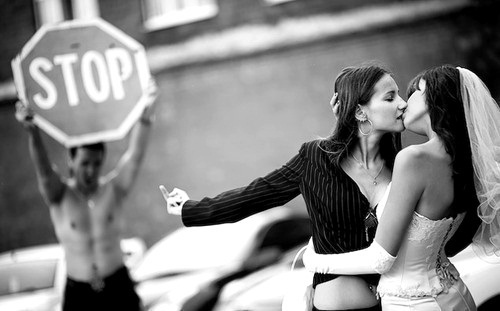About three months ago, I was walking down a quiet street in Rio de Janeiro with my mother, who had come to visit me in Brazil. I was giving my mom a tour of my neighborhood when an adorable same-gender couple walked in our direction. As they drew nearer, they playfully entwined fingers and slowed down momentarily to indulge in a loving kiss. Generally, when I see cute queer couples cuddling and mutually fondling each other in public, I respond in one of three ways:
1. I giggle and gush at how adorable they are.
2. I lower my shades, raise whichever fist is adorned with my rainbow bracelet, and walk by as if I’ve slain every homophobe in the history of the world.
3. I grumble bitterly because I am very single and then I find myself a chocolate bar.

On this particular afternoon, I fidgeted in quiet anxiety as my mother eyed the two affectionate young men. My mom is not really a fan of queerness — I have not even come out to her yet — and I feared she would say something offensive to the lovers. Well then, how did my mother react to this pair?
“Hmm… I never knew people did that here.”
The truth of the matter is that queer people are doing that everywhere. We do that in the U.S., we do that in Brazil, we do that in our bedrooms, but most interestingly, we sometimes do that in the street and other public spaces. Aside from PDA (which I think we can safely use as a catch-all for “that“) simply being a fun activity, our public displays of affection can go from being cute to something quite political.

“Kissing my girlfriend in Flatbush, Brooklyn could double as an act of love and as a political act of changing the culture,” reflects Courtney Baxter in her piece “Queer in Public.” She explains, “By living out the personal is political mantra, we transform from invisible to visible and provide hope for our queer sisters and brothers in less tolerant nooks of the world”. When we are affectionate in public, we assert that our identities are, in fact, valid. We engage in a form of community uplift that demonstrates that our relationships are not shameful.”

However, while in Brazil, I learned that sometimes I consider queer affection too public. In November of 2012, I wandered along Copacabana beach among a throng of people decked out in glitter and rainbows for Rio Pride. The atmosphere was festive from the start, but it was not long before the scene got… erotic. Attractive people meandered through the crowd towards other attractive people and in a matter of moments, Pride looked more like an orgy than a march. Rio Pride meant seeing many people not only kissing in the streets, but also having sex and being extremely intimate in public; and, in spite of my general reactions to PDA, I found myself repulsed by this openness of sexuality. Initially, I could not fathom the beauty of fucking in the street until a Brazilian friend explained to me that public displays of promiscuity (let’s call it PDP), especially in the street, is not just a glorified form of “sluttishness” — even though there is nothing wrong with being a slut if one chooses. She taught me that PDP, as well as PDA, is a form of militancy.
For a while, I unconsciously had subscribed to the notion that queer PDA was acceptable as long as it was “respectable” and fit the standards of a hetero-patriarchal moral compass (i.e- between two people and in moderation). I really had to challenge the respectability politics I had unknowingly invested in by recognizing that my PDA and the PDA I observe should not quietly settle for tolerance from the rest of the world, but rather demand acceptance. PDA and PDP are the ways that we declare the streets a space to be reclaimed. The streets connect us humans to one another, and by locking lips on street corners, we remind the world that we have right to be connected to society regardless of the activity or the number of people participating in said activity. We translate our acts of affection as quotidian experiences instead of pathological shame. Our public displays of affection have the power to move us from the periphery to the center of society by showing that our love, lust, and everything in between are legitimate and do not need to be hidden.
Special Note: Autostraddle’s “First Person” column exists for individual queer ladies to tell their own personal stories and share compelling experiences. These personal essays do not necessarily reflect the ideals of Autostraddle or its editors, nor do any First Person writers intend to speak on behalf of anyone other than themselves. First Person writers are simply speaking honestly from their own hearts.
Helen McDonald is a 20-something college student living off of bad cooking, social justice and a lil snark. She also discusses the intersections of race, gender, and sexuality on her personal blog revolutionaryrainbows.tumblr.com and is a contributing writer at ElixHer.com.

